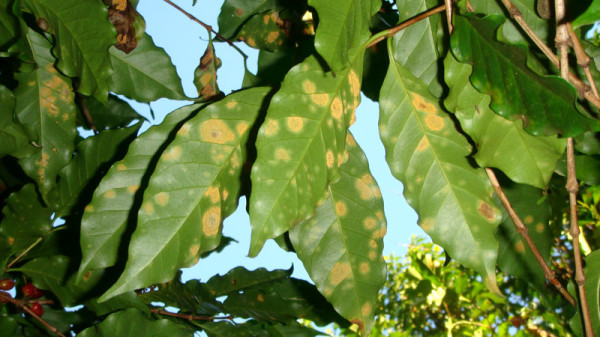by Michael Sheridan of CRS Coffeelands Blog
The Famine Early Warning System Network (FEWSNET), a USAID-funded initiative that monitors hunger in chronically food insecure countries around the world, late last week released a special report on Central America, where coffee leaf rust continues to pose a threat to vulnerable families.
The lone piece of good news — that production declines for the 2013/14 crop year were lower than expected — was crowded out by a long list of bad news from the coffeelands and this chilling headline: poor households in Guatemala’s highlands and southern Honduras are resorting to “atyptical, negative coping strategies” and will face acute food insecurity through the first half of the year.
(more: Materia Gris: How One Honduran Cooperative is Winning the Fight Against Leaf Rust)
The report offers key insights into the livelihood prospects for the two groups most vulnerable to the impacts of coffee leaf rust: smallholder coffee farmers and unskilled farmworkers who depend on the annual harvest for income.
(more: A Full Report from the First International Coffee Rust Summit)
-
Smallholder farmers.
FEWS NET reports that coffee production in Central America is down 16-32 percent for the 2013/14 crop year over 2011/12 levels at a time when prices are slumping — down 60 percent from the market peak of 2011. For the second straight year, farmers are bringing less coffee to market and earning less for what they do manage to produce. To make matters worse, production costs are rising as growers invest more in rust mitigation efforts, squeezing profit margins even further. FEWS NET suggests that coffee farming could become unprofitable for smallholders if these three trends continue for much longer.
-
Farmworkers.
If times are tough for growers, they may be even tougher for farmwokers. Demand for labor during harvest is down this season, and farmers are paying lower wages to the farmworkers they do hire. Incomes in households that are dependent on the annual coffee harvest are expected to decline significantly. These are generally the poorest households, whose members have few skills, little or no land of their own, and depend overwhelmingly on income from agricultural labor to purchase food.
-
The food security outlook.
Notwithstanding the grim outlook for coffee, FEWS NET does not foresee any acute threats to food security in 2014 in El Salvador or Nicaragua thanks to several consecutive average to above-average basic grain harvests and continued low food prices across the region. The story is different for the altiplano of Guatemala and southern Honduras, however, where the lean season is starting now, and where food insecurity is expected to be acute until the next grain harvest beginning in August. The food security outlook will deteriorate in all four countries with any unforeseen shocks to staple crop production and/or food prices.
-
“Atypical, negative coping strategies.”
This is how FEWS NET describes the way families in parts of Guatemala and Honduras have responded to coffee leaf rust. It strikes me that this language may seem cryptic to a general audience. For folks like me, used to reading international development literature, it conveys a clear and present danger. Negative coping strategies, common in poor households during times of crisis, are ones in which households take short-term measures to meet their immediate needs that will undermine their ability to rebound, rebuild and prosper over the long term. These negative strategies tend to follow a stepwise pattern in which families mortgage gradually more of their future aspirations to address acute short-term challenges. They may start with small measures of thrift, like eating less and working more. If these don’t suffice, they move to more aggressive strategies, perhaps pulling children out of school, taking out loans or selling off minor assets. When these aren’t enough, they may sell their farms or homes and migrate. These negative coping strategies are worrying enough on their own. The fact that FEWS NET is seeing strategies that are also atypical – perhaps the resort to more desperate measures sooner – may be cause for even greater concern.
Michael Sheridan
Michael Sheridan is the Chief Executive Officer of the Coffee Quality Institute, a nonprofit organization with a mission to improve coffee quality and the lives of those who produce it. Sheridan has been leveraging market forces to make coffee work for smallholder farmers and farm workers since 2004. Most recently he directed progressive green coffee sourcing activities and direct-trade partnerships at Intelligentsia Coffee. Prior to that he worked to deliver initiatives in the coffee sector in Central and South America on behalf of Catholic Relief Services.







Comment